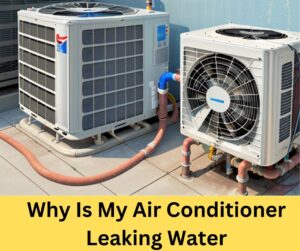Experiencing the frustration of your air conditioning compressor not turning on during scorching summer days can be a real ordeal. As your home becomes uncomfortably warm, the urgency to resolve the issue intensifies. But fear not, because we’re here to provide you with a comprehensive guide on “Why is my AC compressor not turning on” and what steps you can take to address the problem. While compressor issues can be challenging, our aim is to equip you with the knowledge you need to troubleshoot, understand potential causes, and explore solutions. If you find that the solution lies beyond your expertise, don’t worry; we’ll also discuss when it’s time to call in an HVAC professional for assistance. Stay connected with us for valuable insights into resolving AC compressor problems, and soon you’ll have your cool, comfortable home back.
Why Is My Ac Compressor Not Turning On

What Does an A/C Compressor Do?
An A/C compressor, short for air conditioning compressor, plays a pivotal role in the cooling process of your air conditioning system. Essentially, it’s the heart of your AC unit. The compressor’s primary job is to circulate refrigerant, a special cooling fluid, throughout the AC system. It takes low-pressure, cool gas refrigerant from the evaporator coil inside your home and compresses it into high-pressure, hot gas. This compressed gas then flows to the condenser coil in the outdoor unit, where it releases heat and turns back into a liquid. This phase change from gas to liquid is what allows the system to cool your indoor air effectively. In essence, the compressor is responsible for pressurizing and propelling the refrigerant, enabling your air conditioner to maintain a comfortable temperature inside your home.
Where Is the A/C Compressor?
The A/C compressor, a crucial component of your air conditioning system, is typically located in the outdoor unit of your AC setup. To be more specific, you’ll find it inside the condenser unit, which is the large, boxy structure positioned outside your home. This outdoor unit houses not only the compressor but also other essential components like the condenser coil and the fan. The compressor’s placement outdoors is strategic; it allows it to efficiently handle the compression of refrigerant and the dissipation of heat, a process essential for cooling the air that’s then circulated indoors. This outdoor location helps keep your home comfortable by removing heat from inside and releasing it outside, making your indoor spaces pleasantly cool during hot weather.
Signs That Your AC Compressor Is Malfunctioning
When your AC compressor is on the fritz, your entire cooling system can be at risk. Recognizing the signs of a malfunctioning compressor is crucial to preventing discomfort and expensive repairs. Here are some common indicators that your AC compressor may be in trouble:
-
Warm Air Blowing from Vents:
- One of the clearest signs is when your air conditioning system is running, but the air coming from the vents is warm instead of cool.
-
Unusual Noises:
- If your AC unit emits strange noises like clanking, banging, or grinding, it could indicate internal compressor issues.
-
Frequent Short Cycling:
- Short cycling, where the AC turns on and off rapidly, might suggest that the compressor is struggling to maintain consistent pressure in the system.
-
Increased Energy Bills:
- A malfunctioning compressor can lead to higher energy consumption, causing your utility bills to spike without a corresponding increase in cooling efficiency.
-
Leaking Refrigerant:
- Refrigerant leaks can occur due to compressor problems. Look for signs such as hissing sounds, ice buildup on refrigerant lines, or oily residue near the AC unit.
-
Tripped Circuit Breaker:
- If the compressor draws excessive electrical current, it can trip the circuit breaker, disrupting the entire system.
-
AC System Doesn’t Start:
- In some cases, a completely failed compressor can prevent the AC system from starting. When you turn it on, you may hear only a humming sound or experience no response.
-
Ice Formation on the Compressor:
- The compressor should never have ice accumulation on its casing. This may indicate low refrigerant levels, often resulting from compressor issues.
-
Visual Damage or Oil Leaks:
- Inspect the compressor for visible damage like dents or cracks in the casing. Oil leaks near the compressor can also signify internal damage.
-
Inconsistent Cooling:
- If your AC cools certain areas effectively while others remain warm, it could be due to a compressor that’s not functioning correctly, resulting in inconsistent cooling.
Can A/C Compressor Be Repaired?
Certainly, let’s talk about whether an A/C compressor can be repaired. When your A/C compressor encounters issues, you might wonder if a repair is possible, or if you’ll need to replace the entire unit. The good news is that, in some cases, repairs are indeed feasible and can save you from the expense of a full replacement.
Common Compressor Repairs Include:
- Capacitor Replacement: Sometimes, a faulty capacitor can prevent the compressor from starting. Replacing the capacitor is a relatively simple and cost-effective repair.
- Electrical Component Fixes: Issues with electrical components like relays or wiring can disrupt compressor operation. Skilled technicians can often repair or replace these parts.
- Refrigerant Leak Repair: If the compressor issue is related to a refrigerant leak, technicians can locate and fix the leak, then recharge the refrigerant, restoring the compressor’s functionality.
- Oil Leaks: In cases of oil leaks, technicians can identify the source of the leak and perform the necessary repairs to prevent further damage.
- Compressor Valve Repairs: Valve problems can sometimes be addressed with repairs or replacements, restoring the compressor’s function.
However, it’s essential to note that not all compressor issues can be repaired. Severe internal damage or complete compressor failure may necessitate a replacement. Deciding whether to repair or replace the compressor depends on factors like the age of the unit, the cost of repairs, and the overall condition of the system.
FAQ:
Why is my AC compressor not turning on when I set the thermostat to cool?
Answer: Several factors can cause this issue, including a faulty thermostat, a tripped circuit breaker, or compressor problems. It’s best to check these components and seek professional help if needed.
Can a dirty air filter prevent the AC compressor from turning on?
Answer: Yes, a clogged air filter can restrict airflow and cause the AC to overheat, leading to compressor issues. Regularly changing air filters can help prevent this problem.
What should I do if I hear a clicking sound, but the AC compressor doesn’t start?
Answer: A clicking sound might indicate a faulty start capacitor or relay. Contact an HVAC technician to diagnose and replace these components if necessary.
Is low refrigerant a common reason for the AC compressor not turning on?
Answer: Yes, low refrigerant levels can prevent the compressor from working correctly. Refrigerant leaks should be repaired, and the system recharged by a professional.
Can a malfunctioning thermostat cause the AC compressor to stay off?
Answer: Absolutely, a faulty thermostat can fail to send the signal to the compressor to start. Checking and potentially replacing the thermostat can resolve this issue.
Conclusion:
In conclusion, when your AC compressor refuses to turn on, it can lead to discomfort and a myriad of questions. By recognizing common signs and understanding potential causes, such as thermostat issues, clogged filters, electrical problems, refrigerant levels, and faulty components, you’re better equipped to troubleshoot and seek professional help when needed. Remember, timely action and professional guidance are key to diagnosing and resolving the problem efficiently, ensuring your cooling system operates effectively and keeps your indoor spaces comfortable.



